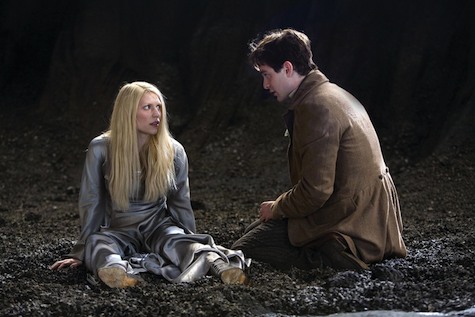Neil Gaiman’s Stardust is a delightful book, a layered and delicate thing that satisfies the adventurer in us all. Its screen adaptation made it to theaters only nine years after the book’s release, but getting it there was a rough road that eventually saw Terry Gilliam drop out of the project and Matthew Vaughn leave to direct Layer Cake. Vaughn happily came back a few years later, and after swapping Sarah Michelle Gellar out for Claire Danes in the leading female role (which I think we can all agree was a win in this case), Stardust hit screens in 2007 to generally kind reviews—but not enough buzz to make it a runaway hit.
Which is not fair because it’s easily one of the best fantasy films of the past 20-odd years.
In the vein of The Princess Bride—which it deliberately mimics, after a fashion—Stardust is a movie for people who like comedy, sword fights, unlikely friends, transformations, personal discovery and above all, love. True love at its sappiest but most earnest, the sort of love that makes you feel bad for being cynical on the subject, that makes you think dash it all, I want to be loved like that and damn the consequences. We don’t make movies like that very often, and when we do they’re often trapped in layers upon sticky layers of rom-com rhetoric that suck the life out of them and highlight the cynicism for us. This is exactly what Stardust in not, and for that alone it deserves attention.
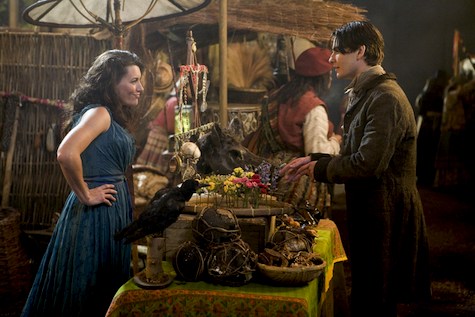
Tristan (who had his name simplified presumably because Tristran is harder to say or because people are less familiar with the variant?) is still in love with the impossible Victoria Forrester and still determined to fetch her a fallen star to prove his love. But the first time he attempts to cross the Wall, he is sent back to his father with a black eye.
Here the film pulls away from some of the moral ambiguity of the book; at the start of the tale, a younger version of Tristan’s father Dunstan is not looking to impress his intended back home, and so his tryst with the captive Una is received in a more charming light—particularly when we find out that Dunstan never got married at all. It gives an entirely different spin on the character—Dunstan Thorn, the single father whose son doesn’t quite fit into his world. In some ways it’s adorably rewarding because how frequently do you find portrayals of awesome single fathers awesomely raising their half-fae sons with love and compassion and encouragement? Stardust as a film loses many of the book’s gray areas, but what is choses to render in black and white is fresh and forces us to rethink some old tropes.
In the film, Tristan’s journey is less about finding that he belongs in another world, and more about figuring out how to be himself. It’s an underrated portion of the journey into adulthood—while we’re busy figuring out what we like, or what we might like to do at early ages, that still conveniently avoids the question “Who am I, really?” Tristan’s greatest quality (played with a jarring sweetness and naiveté by Charlie Cox) is his willingness to go along with everything the journey hands him. And that includes realizing that his ideas about the world are inevitably right and wrong by turns, and choosing to handle those lessons with a fair share of humility. He’s the sort of hero you wouldn’t mind more kids emulating; funny enough, he actually has very few strengths (even once he gets some helpful sword-fighting lessons) besides dreaming big and being genuinely kind. What Tristan teaches us is not that it’s important to be brave, or be strong, or even to learn where you belong—though he does by the end—but that meeting your life’s greatest challenges with eagerness and a good heart overrides all attempts at heroism.
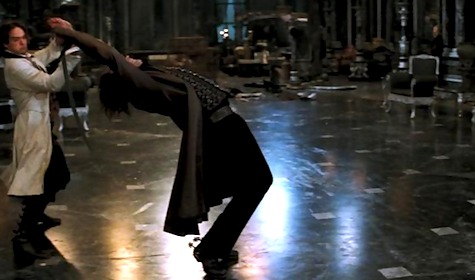
Though the swordfight he has with the dead body of his uncle is admittedly one badass piece of fight choreography.
The bit parts are all played out with infinite candor, from Mark Williams as the goat-turned-inn-keeper, to Ricky Gervais putting his own spin on a classic seedy salesman of magical goods. We get fabulous turns from Peter O’Toole, Mark Strong, Michelle Pfeiffer, and of course Robert DeNiro, who you can tell is just having the time of his life getting the chance to be flamboyant and play dress up in petticoats and boas. It is unarguably one of the best roles he’s ever taken on.
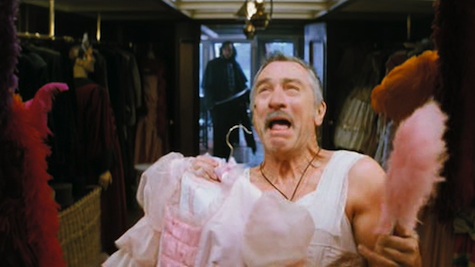
I’m reticent to use the word “romp” when describing movies because it always smacks of faint praise in my mind, but the unbridled rollicking nature of the film is one of its best features by far (that is only helped along by a truly gorgeous soundtrack from Ilan Eshkeri, a frequent collaborator with Vaughn). The film is full of small touches that belie the thought put into every frame: when Primus is slain we find that his blood is blue; Yvaine’s level of star-glow is carefully monitored and adjusted in each scene; and items from “our world” keep showing up, likely bought in markets just like the one that happens near Wall.
This is a movie in which acceptance in necessary, though it is full of people who are fighting the process: the witches cannot accept their aging bodies and limited lifespans; Tristan cannot accept that Victoria won’t see him as more than a shop boy; Septimus cannot accept anything but his father’s throne, even if it means he has to slay his entire family to wear the crown. Even Captain Shakespeare shies away from acceptance, unwilling to let his crew see him prancing about in dresses with paper fans. Unbeknownst to him, the crew accepted him long ago exactly as he is, and don’t find him any less “manly” for it either. Some viewers have found it strange that Shakespeare’s subplot was given so much time and attention, but his journey is really just an easier way of illustrating the central themes of the film: accept yourself as you are, and the valuable people in your life will do the same.
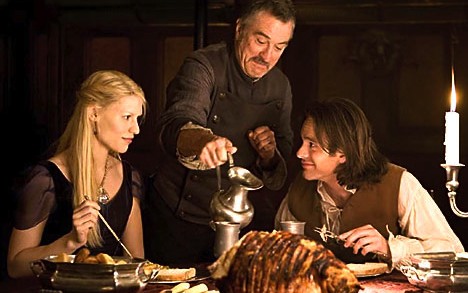
Unsurprisingly, it is only once Tristan has accepted himself that Yvaine realizes she loves him. A pretty clear line from Point A to Point B, there. And Shakespeare—a figure who has spent such a long time cultivating his personal self—was the perfect person to show Tristan the hows of that road, doling out valuable advice, good haircuts, and brand new “très you” clothes. The Wall-bound duo eventually make it back to the faerie market, but not before Yvaine has confessed her love to Tristan-as-a-mouse, thinking he couldn’t possibly understand her in rodent form. Honestly, it beats John Cusack with a boombox any day of the week.
Tristan does stop off at home to say goodbye to dear Victoria, and he’s not particularly kind to her when he does so, but can you really blame him? It’s the inevitable moment of realization—this is what I wanted before? This is the person I was so stupid over? He tells her what he himself needed to hear from the beginning, a piece of advice that she could do well with also: grow up and get over yourself. Then he leaves so she can happily marry Humphrey (wait, oh no, it’s too good, it’s a blonde, mustached Henry-Superman-flipping-Cavill! I love everything about this), which is too bad because later we see Humphrey flirting with Captain Shakespeare, so that marriage is definitely not gonna go how she expected.
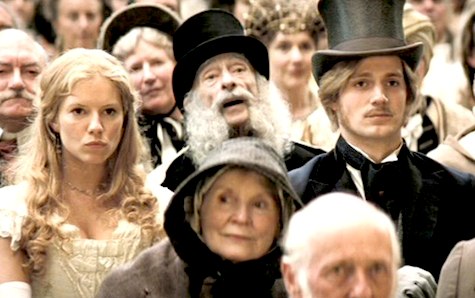
By the time Tristan gets back, Yvaine has been kidnapped by Lamia, and is about to have her heart cut out by the three evil witch sisters. Tristan still isn’t really much of a fighter, so the rescue goes a bit differently than he planned, and love saves the day. Literally. The power of Yvaine’s love for Tristan, the ability to focus that love due to his presence, allows her to shine so brightly that she dissolves Michelle Pfeiffer into a couple dust motes. In a world where most fairy tales turn on the Weekly Prince Charming proving his love by cutting through briars, kissing without permission, or forcing every woman in the kingdom to try on the same uncomfortable shoe, this is such a beautiful twist. A twist that didn’t have to occur by making Yvaine take up a sword and “fight for her man.” One heart in exchange for another and every evil in the world conquered.
I’m not crying, there’s just a thing. Poking me in the eyeballs.
Tristan’s mom and dad get to be together after all these years (d’aww), he and Yvaine get to rule Stormhold, and the kingdom gets its first line of rulers who aren’t cruel and capricious. Then, rather than Tristan dying one day and Yvaine taking over for him since she’s not going anywhere anytime soon, they take their wedding gift—one of those handy Babylon candles—and adjourn to the sky together. Because the only people who can live forever are those who have the heart of a star. And Tristan has one, doesn’t he?
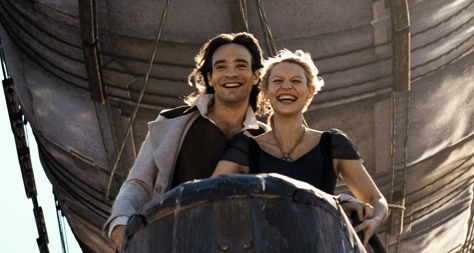
Just something prodding me in the tear ducts…. I’m fine.
There are some movies that are designed specifically to make you so damned happy that screenings put you in danger of smiling until your face feels like it ran 5K on behalf of your legs. Stardust is one of them, so do yourself a favor and watch it. It is probably the best piece of advice anyone is going to give you today, and it’s all for free.
Emmet Asher-Perrin actually shrieked last time she saw the movie and realized that Humphrey was Golden Cavill. She has written essays for the newly released Doctor Who and Race and Queers Dig Time Lords. You can bug her on Twitter and read more of her work here and elsewhere.










